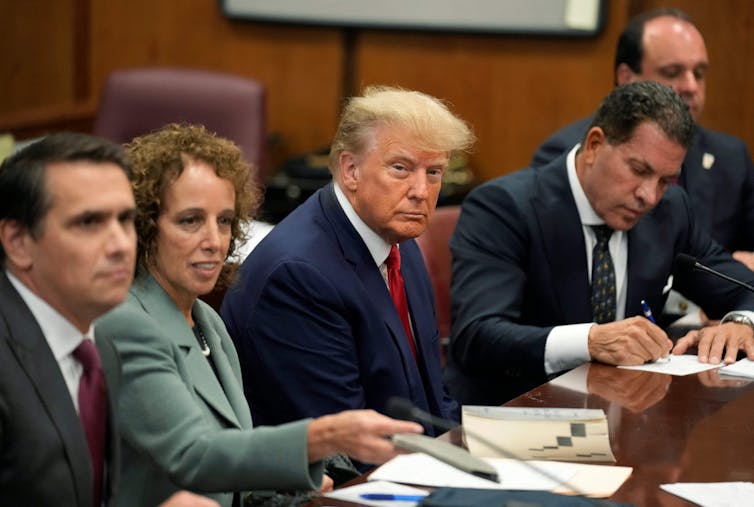Here’s how prosecutors will try to prove that he knowingly lied and intended to break the law

[ad_1]
What was Donald Trump thinking when he set about trying to preserve the presidency after losing it to Joe Biden?
This is the main question the jury must consider in Trump’s federal trial With charges announced on August 1, 2023caused by Trump’s attempts to overturn the results of the 2020 presidential election.
Last accusations Trump conspiring to defraud the United States; obstructing an official government action; and denying US citizens their civil rights – or, more precisely, their right to have their votes counted.
In a fourth count, Trump was charged with obstructing or attempting to obstruct official actions of Congress.
like Researcher in criminal lawI think the key to conviction or acquittal on these counts will be what the jury believes Trump’s mental state at the time of these alleged events.
criminal motive
US criminal law requires that he not only engage in an act, but that he engage in that act with a guilty mind. In other words, it is not enough to do something; The accused must intend to do the thing to merit the charge.
And in some laws, Criminal negligence It is enough to convict someone of a crime. This means that the person grossly violated some duties of care, even if it was unintentional.
On the other end of the spectrum, some laws require specific intent as the state of mind required to convict someone. specific intention Means that the accused intended to cause the specified consequence that followed.
With regard to the allegations made against Trump, the government must prove that Trump knowingly lied and intended to break the law.
The last charge, obstruction of congressional action, requires the government to prove it corrupt intentThat is, the doer intended to do the thing, and his motive for doing it was illegitimate.
In short, the government must prove that Trump intended to obstruct the certification of Electoral College votes in order to annul what he knew were legal elections.
Guilt awareness
The next logical question is how can intention be defined?
It is impossible to look into someone’s mind to know their intentions. As a result, the law deploys many tools that allow jurors to infer the defendant’s intent, largely from his or her actions.
Guilt awareness It is the leading tool.

Seth Wing/Pool/AFP via Getty Images
Suppose someone is accused of murder, a charge that requires a specific intent to kill. The defense is that the death was the result of an accident.
The government is allowed to present evidence showing that the accused hid the body, disposed of the gun, and attempted to concoct a false alibi. None of these actions are compatible with an accident. Instead, the defendant’s actions demonstrate his awareness of guilt, allowing the jury to infer intent.
Another example might be an accountant who comes into the office in the middle of the night and logs into a co-worker’s account to change a client’s ledger. These actions are not consistent with an innocent accounting error. They show guilt awareness.
Trump’s actions
The same principle applies to Trump’s election case, as well as the other federal indictment in which Trump is accused of taking classified documents to his home in Mar-a-Lago, Florida, in violation of federal law.
In late July 2023, for example, Special Counsel Jack Smith added new charges to The original indictment Trump allegedly directed two of his staff to delete security camera footage of storage boxes containing classified documents being moved before federal investigators arrived.
This behavior can be used as evidence of Trump’s awareness of guilt and evidence of his intent to commit a crime.
In another exampleTrump had a conversation in July 2021 at his summer home in Bedminster, New Jersey, in which he talked about a military document related to Iran.
In that taped conversation, Trump said, “As president, I could have declassified it. Now I can’t, you know, but that’s still a secret.
As the country contemplates these indictments, it is important to remember that federal prosecutors will analyze everything Trump did, say, or hear to argue that his behavior indicated he intended to commit the crimes with which he is accused.
[ad_2]
Source link





